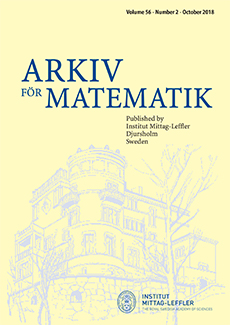Abstract
This paper presents an elementary proof of the following theorem: Given {rj} ${}_{j}^{m}$ =1 with m=d+1, fix $fix R \geqslant \sum\nolimits_{j = 1}^m {r_j } $ and let Q=[−R, R]d. Then any f∈ L2(Q) is completely determined by its averages over cubes of side rj that are completely contained in Q and have edges parallel to the coordinate axes if and only if rj/rk is irrational for j≠k. When d=2 this theorem is known as the local three squares theorem and is an example of a Pompeiu-type theorem. The proof of the theorem combines ideas in multisensor deconvolution and the theory of sampling on unions of rectangular lattices having incommensurate densities with a theorem of Young on sequences biorthogonal to exact sequences of exponentials.
Funding Statement
The third author was supported by NSF Grant DMS9500909 and gratefully acknowledges the support of Bill Moran and the Mathematics Department of Flinders University of South Australia where certain portions of this work were completed. The authors thank the referee for valuable comments and suggestions.
Citation
Karlheinz Gröchenig. Christopher Heil. David Walnut. "Nonperiodic sampling and the local three squares theorem." Ark. Mat. 38 (1) 77 - 92, March 2000. https://doi.org/10.1007/BF02384491
Information





